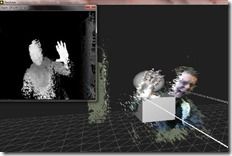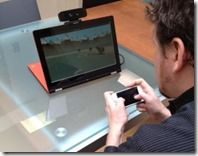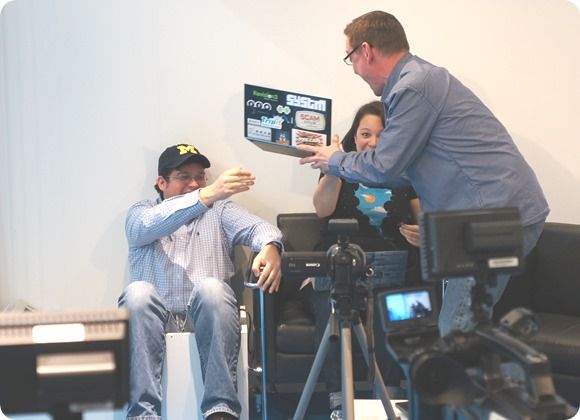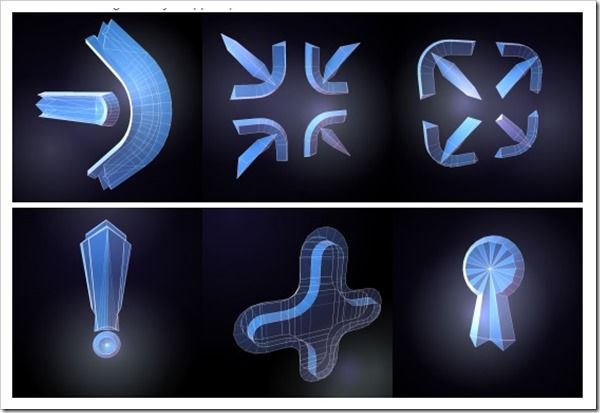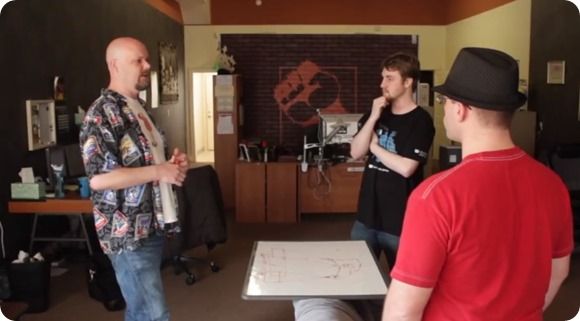7 teams are finding out how hard perceptual computing can be in Week3 of the Ultimate Coder Challenge where showcase perceptual computing applications are being built for a Lenovo Yoga 13.
I’m involved with the judging of the Ultimate Coder event and every week you’ll find an update from me as I analyse the teams progress. We’ve also got a video for you and it’s a scorcher – due to the ‘event’ that happens 5 minutes into the video. It’s a must-watch and embedded below.
I’ve read through 7 long posts of detailed information which, this week, are projected from the minds of coders. There’s a ton of code being presented along with a few nice videos and some information about to handle variation and error data being produced by the PC receiver.
You can find all our Ultimate Coder posts here
Our Ultrabook software developer resources are here
All our Perceptual Computing posts here
This week is a little fuzzy for me and it’s not just to do with 2 weeks of trade-show work. There’s a lot of coding happening, the 3D data has a certain amount of fuzziness and I can’t see where people are on their timelines. They’ve all had time to write some good posts though and there’s a lot to learn from reading through them. My summary and links to all the posts are below. If you’re a coder working in the UI, VR, PC space, I’m sure you’ll enjoy the detailed information. You’ll enjoy the video too because something happened. Here’s a hint…
I’m at CeBIT this week and i’ve spoken to a couple of companies in the Perceptual Computing space. There are two questions i’m asking them. 1) When will this hardware be available for building into the screen frame on an Ultrabook. 2) Will the OEMs pick it up and make it happen? I’ve heard that it will be technically possible to get this hardware integrated by 2014. Intel told me they want products to include this hardware in 2014 but there’s a feeling out there that it won’t really happen until 2015. Everyone agrees though that it makes the laptop very interesting again, both from a developer point-of-view and a users point-of-view.
Read-on for the competitors progress summaries.
Lee Bamber
Lee throws up a very impressive video this week, the result of a straight 29 hour coding session. Seriously Lee – that’s too much I’ve been working CeBIT in Hannover this week myself and I though my days were long! In Lee’s post you’ll hear about the use of third part libraries and open source code. If it wasn’t for advanced development tools, SDKs and Open Source Code I’m not sure the single-person teams in this competition would be able to compete with the teams. Lee talks about how he’s handling some of the variations in raw data coming from the Perceptual Computing hardware too and that’s a theme you’ll hear about from most of the teams. Lee’s full week 3 Ultimate Coder post is here.
Sixense
Sixense have found out how to record users experiences through video in Unity, talk about inaccurate and error data and get busy with some really nice artwork ideas. As for the gameplay they’ve now got a storyline agreed. Sixense are a big team so that factors into the final judging. We’re expecting a high quality result! The full Sixense post is here.
Eskil Steenberg
Eskil claims he’s finished his Beta which is fantastic progress for this stage but it looks like he hasn’t integrated the Intel PC hardware yet. As the project is based around demonstrations of Perceptual Computing he hasn’t quite reached Beta stage yet. He gives a lot of information about UI design and has some nice artwork in his post which you can read all about here.
Peter O’ Hanlon
Peter, another single-person team, is hitting the code hard. Like Lee though, he’s looking for third party open-source code to give himself the necessary boost. In his post this week he talks about the problem having large amounts of data to sort in real time and that’s something I’m watching closely. While the Ultrabook is capable of some serious compute power, you should always be looking for ways to reduce the load. Finally, important for anyone, is keeping focus on the original aims of the project and not getting side-tracked by ‘cool’ features that might affect the quality of the core functionality. Leave that for later Peter! Week 3 post is here.
Infrared5
This is another team that has good human resource on the project so we’ll be expecting a higher-quality and more polished end-product but by looking at this teams momentum, as last week, you get the impression that they’ll do the business with their game. They seem to like the Lenovo Yoga 13 as a gaming device because of the foldable form factor and the processing power. I agree that it stimulates quite a bit of interest from devs but it also stimulates a lot of interest from potential customers too! Details and tips for devs and thoughts on Perceptual Computing in general are in their Week 3 post.
Simian Squared
Wasn’t it Simian Squared who were talking about not aiming for something too close to reality? “…we’ve made an accurate simulation of what would happen if you put a soft bit of clay near a rampaging ape demanding food.” It doesn’t appear that this was by design either so they’ll have to take this slightly fuzzy data, as everyone else is, and turn it into something usable and enjoyable. That means more processing and more delay so some cunning techniques will have to be employed in order to make it work. The Simian Squared post is here.
Code Monkeys
Eye tracking is hard. The Code Monkeys have had similar problems as others who’ve tried to implement eye tracking. They’ve posted some code examples for Unity users and have a bit of details in their video. You’ll find all of that and more here.
Video
The video below was mainly aimed at the teams but there’s something, one-thing, at five minutes in, for everyone. All I’ll say is that Sascha is OK and we’re still laughing.
Important links for the Intel Ultimate Coder Challenge: Going Perceptual Competition
- Intel competition Website
- Join everyone on Facebook
- Competitors list and backgrounder
- Twitter stream #ultimatecoder
- All our perceptual computing coverage can be found here.
- All posts about this and the previous software competition can be found here
Full disclosure – We are being compensated for content related to the Ultimate Coder and to attend an Intel event. We have committed to posting at least once per week on this subject and judging the final applications. All posts are 100% written and edited by Ultrabooknews.

